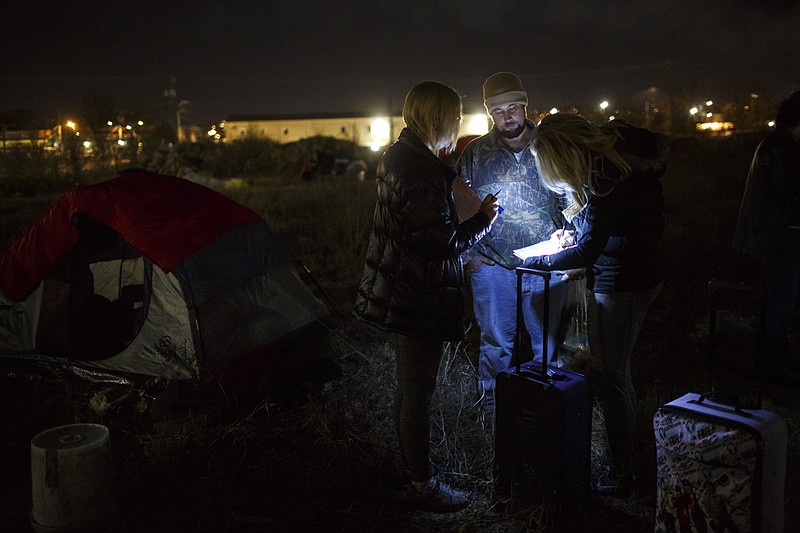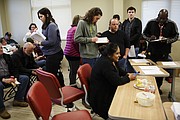Tucked away from the street, at the far end of a field and behind some tall, dry bushes, a homeless tent city lies.
On Thursday, a camp fire burned in the distance and the smell of smoke filled the air as a small group of volunteers led by Theresa Biggs, housing navigator for the Chattanooga Housing Authority, made their way toward the entrance. A man met them there.
"Hi! I'm Theresa," she announced herself.
"Oh! I remember you," the man said enthusiastically as he led her and the others toward a cluster of tents.
The volunteers were helping with the annual Point-in-Time count, an unofficial census coordinated by the Chattanooga Regional Homeless Coalition and other local agencies.
The purpose of the census is to gauge what the homeless population looks like each year, said Mark Williams, interim executive director for the Chattanooga Regional Homeless Coalition. It answers questions like how long a person has been homeless, if they have any kind of physical or mental disability and if they are veterans.
Participation in the survey is voluntary, and any data collected is entered into the Homeless Management Information System, a tool used to collect data on the provision of housing and services for homeless people.
The information is also reported to the U.S. Department of Housing and Urban Development, which compiles the data from across the country and releases a nationwide report later in the year.
The latest national report showed the homeless population saw an increase for the first time since 2010. Nearly 554,000 people were homeless, a figure that was up nearly 1 percent from 2016.
Of that total, 193,000 people had no access to nightly shelter and instead were staying in vehicles, tents, the streets and other places considered uninhabitable. The unsheltered figure is up by more than 9 percent compared to two years ago.
Chattanooga's numbers from this year's count won't be ready for several months, but in recent years, the city has seen a drop in the number of people experiencing homelessness. From 2015 to 2016, the number fell from 634 to 527 across 11 counties in Chattanooga and Southeast Tennessee.
On Thursday, volunteers set out for about 10 locations, some more difficult to access than others. Coordinators gave advice before teams headed out. They told volunteers to be loud so it doesn't seem like they're sneaking up on people and gave them pointers on how to handle potentially awkward situations.
"Be mindful of people," said Sam Wolfe, one of the outreach coordinators. "I think one of the things to remember is this is someone's home. It may not be the home that you envision or the home that you like or think it's something that's nice, but most of these people, that's all that they have."
He said people he encounters tell him the best thing about the outreach program is that it shows them that someone cares.
"For so many people out on the streets that you're going to talk to, you may be the only person that's been decent to them in months," he told volunteers gathered in a small building before they set out.
Contact staff writer Rosana Hughes at rhughes@timesfreepress.com or 423-757-6327 with tips or story ideas. Follow her on Twitter @HughesRosana.


